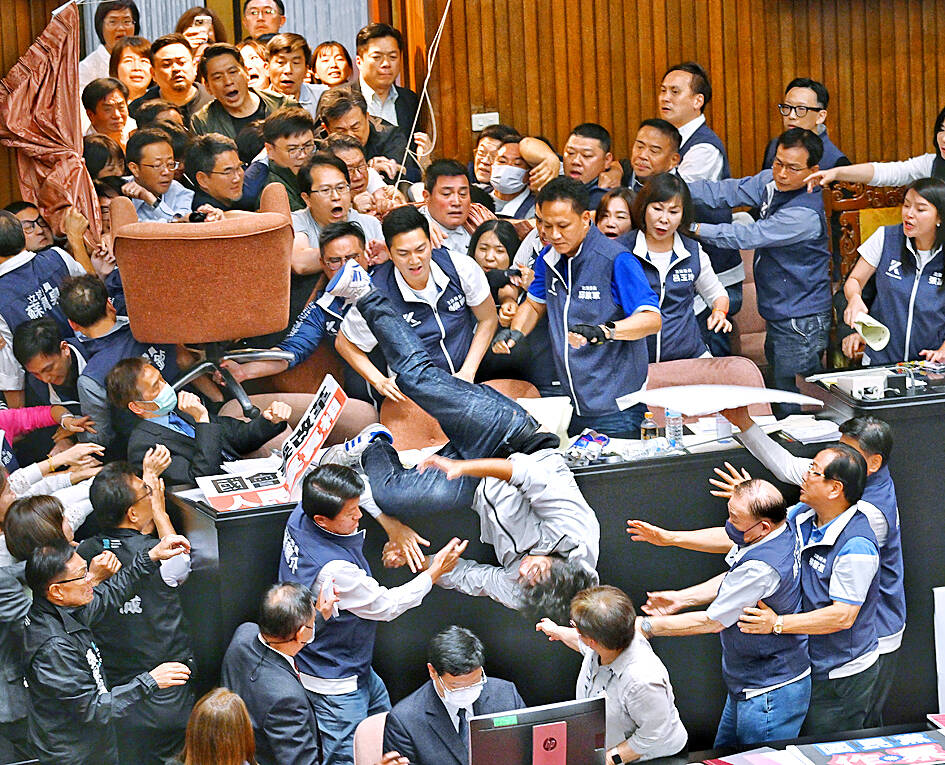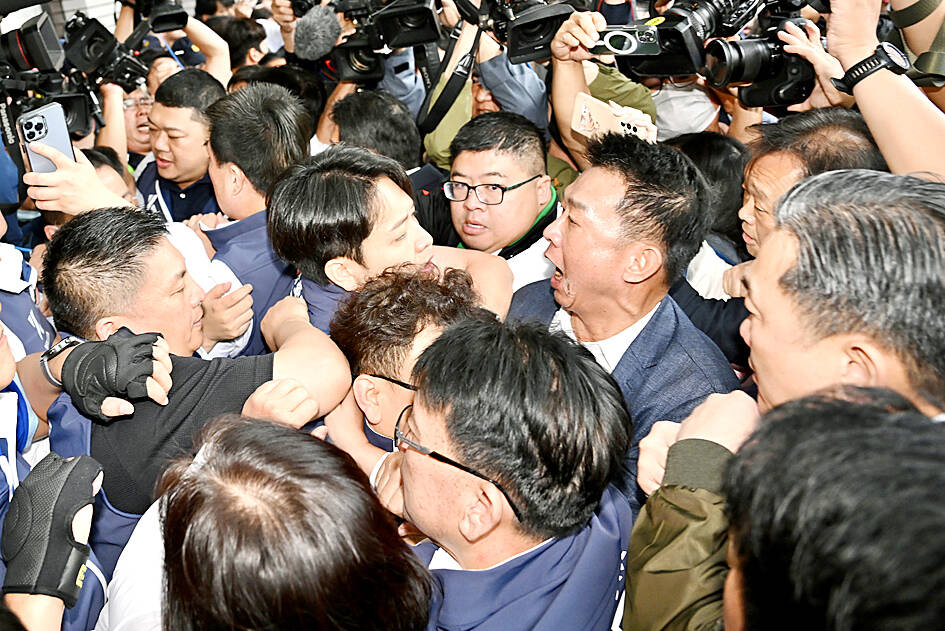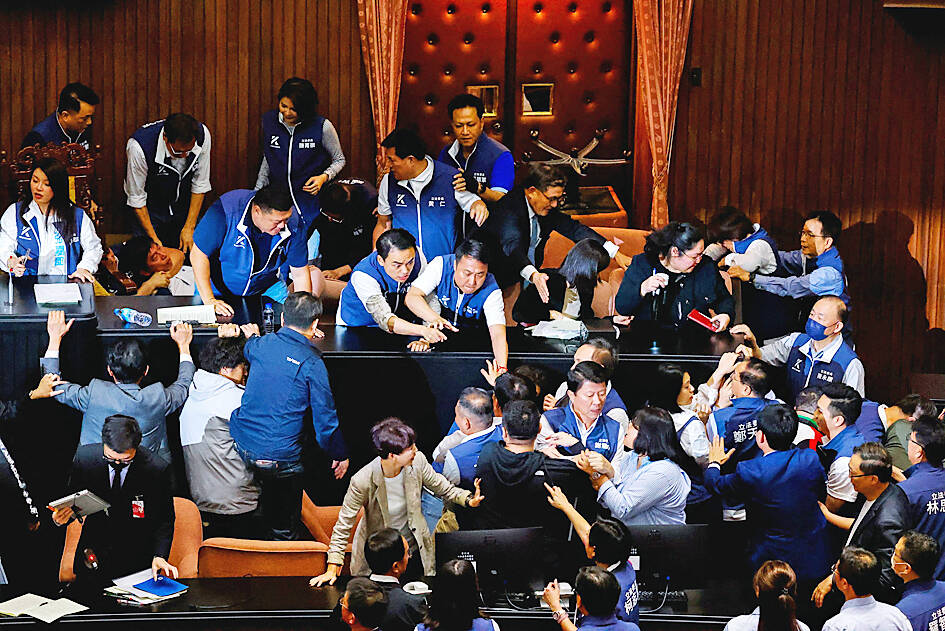A massive brawl erupted between governing and opposition lawmakers in the main chamber of the legislature in Taipei yesterday over legislative reforms.
President-elect William Lai (賴清德) is to be inaugurated on Monday, but his Democratic Progressive Party (DPP) lost its majority in the legislature and the Chinese Nationalist Party (KMT) has been working with the Taiwan People’s Party (TPP) to promote their mutual ideas.
The opposition parties said the legislative reforms would enable better oversight of the Executive Yuan, including a proposal to criminalize officials who are deemed to make false statements in the legislature.

Photo: Fang Pin-chao, Taipei Times
“The DPP does not want this to be passed as they have always been used to monopolizing power,” said KMT Legislator Jessica Chen (陳玉珍), wearing a military-style helmet.
The DPP said the KMT and the TPP are improperly trying to force through the proposals without the customary consultation process in what it called “an unconstitutional abuse of power.”
“Why are we opposed? We want to be able to have discussions, not for there to be only one voice in the country,” DPP Legislator Wang Mei-hui (王美惠) said.

Photo: Lo Pei-de, Taipei Times
When the session started yesterday morning, there was pushing and shoving as KMT lawmakers formed defensive walls at the podium to shield Legislative Speaker Han Kuo-yu (韓國瑜), enabling him to preside over the process for raising motions, reading bills and proceed to a vote.
Even before votes started to be cast, some lawmakers screamed at and shoved each other outside the legislative chamber, before the action moved into the chamber itself.
In chaotic scenes, lawmakers surged around the speaker’s podium, some leaping over tables and pulling colleagues to the floor.

Photo: Ann Wang, Reuters
During the physical altercations, KMT Legislator Hsu Chiao-hsin (徐巧芯) at one point pulled out a flute and played the national anthem, while Chen blocked the entrance to the podium area and shouted: “I’ll take on 10 of you.”
DPP Legislator Huang Jie (黃捷) protested being “physically handled” by Chen and described the altercation “as being bitten by a beast.”
During a recess at about 3pm, DPP Legislator Kuo Kuo-wen (郭國文) snatched documents from Legislative Yuan Secretary-General Chester Chou (周萬來) and ran out of the chamber.
KMT lawmakers demanded that Kuo return the documents and explain himself, while DPP lawmakers claimed Hsu attempted to strangle Wang with a DPP party flag.
Kuo later told reporters that his actions were “justified” as the opposition parties “have been increasingly violent,” adding that the contents of the files he obtained could not be made public.
The differences between the governing and the opposition lawmakers could not be reconciled despite multiple cross-caucus negotiations headed by Han.
With a majority, the opposition at 5:32pm voted to extend the legislative session.
At about 7pm, DPP Legislator Puma Shen (沈伯洋) and fellow DPP lawmakers again tried to force their way up the podium and occupy the speaker’s seat, but failed.
At 8pm, five lawmakers — Shen, Chung, DPP legislators Chuang Jui-hsiung (莊瑞雄) and Chiu Chih-wei (邱志偉), and KMT Legislator Wu Tsung-hsien (吳宗憲) — were taken to hospital.
As of press time last night, the legislative session was still ongoing.
The KMT holds 52 seats in the 113-seat legislature, while the TPP has eight and the DPP has 51. There are also two independent lawmakers who are ideologically aligned with the KMT.
Additional reporting by CNA

The Central Election Commission has amended election and recall regulations to require elected office candidates to provide proof that they have no Chinese citizenship, a Cabinet report said. The commission on Oct. 29 last year revised the Measures for the Permission of Family-based Residence, Long-term Residence and Settlement of People from the Mainland Area in the Taiwan Area (大陸地區人民在台灣地區依親居留長期居留或定居許可辦法), the Executive Yuan said in a report it submitted to the legislature for review. The revision requires Chinese citizens applying for permanent residency to submit notarial documents showing that they have lost their Chinese household record and have renounced — or have never

A magnitude 5.6 earthquake struck off the coast of Yilan County at 12:37pm today, with clear shaking felt across much of northern Taiwan. There were no immediate reports of damage. The epicenter of the quake was 16.9km east-southeast of Yilan County Hall offshore at a depth of 66.8km, Central Weather Administration (CWA) data showed. The maximum intensity registered at a 4 in Yilan County’s Nanao Township (南澳) on Taiwan’s seven-tier scale. Other parts of Yilan, as well as certain areas of Hualien County, Taipei, New Taipei City, Taoyuan, Hsinchu County, Taichung and Miaoli County, recorded intensities of 3. Residents of Yilan County and Taipei received

Taiwan has secured another breakthrough in fruit exports, with jujubes, dragon fruit and lychees approved for shipment to the EU, the Ministry of Agriculture said yesterday. The Animal and Plant Health Inspection Agency on Thursday received formal notification of the approval from the EU, the ministry said, adding that the decision was expected to expand Taiwanese fruit producers’ access to high-end European markets. Taiwan exported 126 tonnes of lychees last year, valued at US$1.48 million, with Japan accounting for 102 tonnes. Other export destinations included New Zealand, Hong Kong, the US and Australia, ministry data showed. Jujube exports totaled 103 tonnes, valued at

BIG SPENDERS: Foreign investors bought the most Taiwan equities since 2005, signaling confidence that an AI boom would continue to benefit chipmakers Taiwan Semiconductor Manufacturing Co’s (TSMC, 台積電) market capitalization swelled to US$2 trillion for the first time following a 4.25 percent rally in its American depositary receipts (ADR) overnight, putting the world’s biggest contract chipmaker sixth on the list of the world’s biggest companies by market capitalization, just behind Amazon.com Inc. The site CompaniesMarketcap.com ranked TSMC ahead of Saudi Aramco and Meta Platforms Inc. The Taiwanese company’s ADRs on Tuesday surged to US$385.75 on the New York Stock Exchange, as strong demand for artificial intelligence (AI) applications led to chip supply constraints and boost revenue growth to record-breaking levels. Each TSMC ADR represents